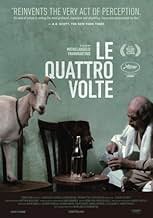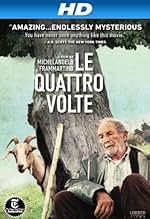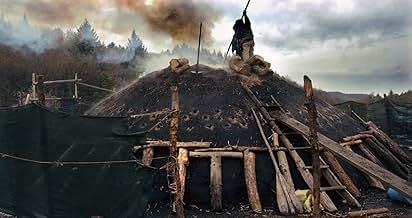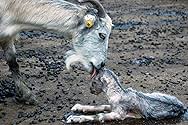VALUTAZIONE IMDb
7,2/10
4414
LA TUA VALUTAZIONE
Un vecchio pastore vive i suoi ultimi giorni in un tranquillo borgo medievale arroccato sulle colline della Calabria, all'estremità meridionale d'Italia. Sopravvive con le capre abbandonate ... Leggi tuttoUn vecchio pastore vive i suoi ultimi giorni in un tranquillo borgo medievale arroccato sulle colline della Calabria, all'estremità meridionale d'Italia. Sopravvive con le capre abbandonate molto tempo fa per gli abitanti del villaggio.Un vecchio pastore vive i suoi ultimi giorni in un tranquillo borgo medievale arroccato sulle colline della Calabria, all'estremità meridionale d'Italia. Sopravvive con le capre abbandonate molto tempo fa per gli abitanti del villaggio.
- Regia
- Sceneggiatura
- Star
- Premi
- 14 vittorie e 14 candidature totali
Recensioni in evidenza
As charming and visually captivating as this film may be, it lacks content which at times seems to be filled with shots that are too long or that do not provide relevant elements to the film (besides offering the already mentioned captivating visuals) and that after a while become exhausting. The problem with this film is that it's too long for it's content but if it had been done as a short it would have probably lacked atmosphere.
This extensive use of long lasting shots and static moments at some point stop creating reflection moments and instead create reasons for the audience to grow bored which, to some extent, takes the effectiveness off the ending. Slow paced movies have to work in a particular way so that the audience may remain focused on the plot, to do this, things have to happen within the story presented; that rarely happens here.
So as other reviews mentioned, if the viewer has the desire to have a closer look at the rural Italian life, yeah, they'll find a sort of... well, slow view of what that is. If you're looking for an art-house kind of thing, this doesn't really work either. The real problem is that it doesn't either show enough rural life in terms of a documentary, nor is it deep enough to be a successful fiction film. Cute, but really wasn't able to engage the story.
This extensive use of long lasting shots and static moments at some point stop creating reflection moments and instead create reasons for the audience to grow bored which, to some extent, takes the effectiveness off the ending. Slow paced movies have to work in a particular way so that the audience may remain focused on the plot, to do this, things have to happen within the story presented; that rarely happens here.
So as other reviews mentioned, if the viewer has the desire to have a closer look at the rural Italian life, yeah, they'll find a sort of... well, slow view of what that is. If you're looking for an art-house kind of thing, this doesn't really work either. The real problem is that it doesn't either show enough rural life in terms of a documentary, nor is it deep enough to be a successful fiction film. Cute, but really wasn't able to engage the story.
I saw this film in Norway where it recently came out in the cinemas.
The title refers to the four seasons and the story follows a cycle of birth, death and rebirth. There is a symmetry in the film, and each part focuses on the fate of one individual (a farmer, a goat and a tree, for instance).
The film makes effective use of the beautiful landscape of Calabria, and the old, ramshackle village. The setting is perhaps in itself the main character of the film. Humans are often viewed from above, and we are in a sense getting the "God" treatment.
There is barely any plot or a story to speak of, yet we go through stages of life that are eternal and inevitable - and we are reminded again and again that all things must pass.
There are life-like documentary aspects to this feature. The film is shot in available light with amateur actors and animals that will endear you. The result is breathtaking and inspiring. The sound scape is also rich: it helps create an emotional journey through every chapter of the film.
I can highly recommend this to anyone interested in unusual films with no dialogue or discernible plot, but anyone also will no doubt be captivated by it's gorgeous setting, it's humble characters or the feeling of watching life pass, unfiltered.
The title refers to the four seasons and the story follows a cycle of birth, death and rebirth. There is a symmetry in the film, and each part focuses on the fate of one individual (a farmer, a goat and a tree, for instance).
The film makes effective use of the beautiful landscape of Calabria, and the old, ramshackle village. The setting is perhaps in itself the main character of the film. Humans are often viewed from above, and we are in a sense getting the "God" treatment.
There is barely any plot or a story to speak of, yet we go through stages of life that are eternal and inevitable - and we are reminded again and again that all things must pass.
There are life-like documentary aspects to this feature. The film is shot in available light with amateur actors and animals that will endear you. The result is breathtaking and inspiring. The sound scape is also rich: it helps create an emotional journey through every chapter of the film.
I can highly recommend this to anyone interested in unusual films with no dialogue or discernible plot, but anyone also will no doubt be captivated by it's gorgeous setting, it's humble characters or the feeling of watching life pass, unfiltered.
"O Lord, you have seduced me, and I was seduced." This, the central sentiment expressed by the Carthusian monks of the Grande Chartreuse monastery in "The Great Silence" (2005), was also how I felt on leaving "Le Quattro Volte" (2010).
As with "The Great Silence," one of the most striking features of "Le Quattro Volte" (The Four Times) is its lack of dialogue. However, whereas for some individuals the 169 minutes of near silence in "The Great Silence" was overly taxing, in this shorter, more widely focused film - quietly reflecting aspects of life in an isolated village in Calabria – the Milanese director Michelangelo Frammartino has given us a predominantly visual poem of place, of space, of people and of the passing of time.
Although not overly religious, it is a spiritually orientated film in which we are asked to consider Pythagoras' contention that we must each know ourselves four times due to the fact that we "have four lives within us - the mineral, the vegetable, the animal and the human".
Therefore within its 88 minute run the small number of central human characters that are featured within it are soon relegated to positions of equality, or of equal vulnerability, before nature. Thus, for example, the goat-herder's animals soon come to the forefront of the film, as do other elements of the animal, vegetable and mineral kingdoms, in order to declare – seemingly – that these other realms also warrant serious and respectful consideration.
An extremely enjoyable and far-from-always-serious film, I found this a beautifully filmed, calming and thought-provoking movie.
As with "The Great Silence," one of the most striking features of "Le Quattro Volte" (The Four Times) is its lack of dialogue. However, whereas for some individuals the 169 minutes of near silence in "The Great Silence" was overly taxing, in this shorter, more widely focused film - quietly reflecting aspects of life in an isolated village in Calabria – the Milanese director Michelangelo Frammartino has given us a predominantly visual poem of place, of space, of people and of the passing of time.
Although not overly religious, it is a spiritually orientated film in which we are asked to consider Pythagoras' contention that we must each know ourselves four times due to the fact that we "have four lives within us - the mineral, the vegetable, the animal and the human".
Therefore within its 88 minute run the small number of central human characters that are featured within it are soon relegated to positions of equality, or of equal vulnerability, before nature. Thus, for example, the goat-herder's animals soon come to the forefront of the film, as do other elements of the animal, vegetable and mineral kingdoms, in order to declare – seemingly – that these other realms also warrant serious and respectful consideration.
An extremely enjoyable and far-from-always-serious film, I found this a beautifully filmed, calming and thought-provoking movie.
Le Quattro Volte is the essence of fine film making, of film making as art that does not need to rely on technological camouflage to tell an engrossing human story. Who needs violence, car chases, explosions, and overwhelming special effects when there are films like this to be seen? If you have ever spent just a single day allowing yourself to be totally absorbed into a small, isolated town (this one just happens to be in the hills of southern Italy), this film will evoke visceral feelings from deep within you of recollection, pathos, and respect for tradition and simple human dignity. With practically no dialog, it is a visual tone poem that speaks volumes about the nature, pace, toils, loneliness, and devotion to ritual of small, traditional communities everywhere.
Le Quattro Volte is a beautiful document. It opens a window on a time, place and people that are very different from modern city life. And yet the cycle man-animal-vegetable-mineral is still ours. While the movie depicts life as it is today in the Italian village (someone is taking a photo with a mobile phone) it could have taken place fifty years ago. The film depicts events at a slow pace, giving you time to absorb the events and landscape. Yet the film is engaging from start to finish. Scenes such as the one where the young goats are playing in the shed or when the dog challenges the boy are captivating, even sitting at the first row in a small art-house cinema.
Lo sapevi?
- QuizThe film is comprised of long takes. One of them lasts an astounding 8 minutes.
- Curiosità sui creditiThe end credits also include a silver fir, the goats of Caulonia and the coal of Calabria among the cast members.
- ConnessioniFeatured in Ebert Presents: At the Movies: Episodio #1.15 (2011)
I più visti
Accedi per valutare e creare un elenco di titoli salvati per ottenere consigli personalizzati
- How long is Le Quattro Volte?Powered by Alexa
Dettagli
- Data di uscita
- Paesi di origine
- Sito ufficiale
- Lingua
- Celebre anche come
- Le Quattro Volte
- Luoghi delle riprese
- Aziende produttrici
- Vedi altri crediti dell’azienda su IMDbPro
Botteghino
- Lordo Stati Uniti e Canada
- 152.530 USD
- Fine settimana di apertura Stati Uniti e Canada
- 16.192 USD
- 3 apr 2011
- Lordo in tutto il mondo
- 717.918 USD
- Tempo di esecuzione1 ora 28 minuti
- Colore
- Mix di suoni
- Proporzioni
- 1.85 : 1
Contribuisci a questa pagina
Suggerisci una modifica o aggiungi i contenuti mancanti









